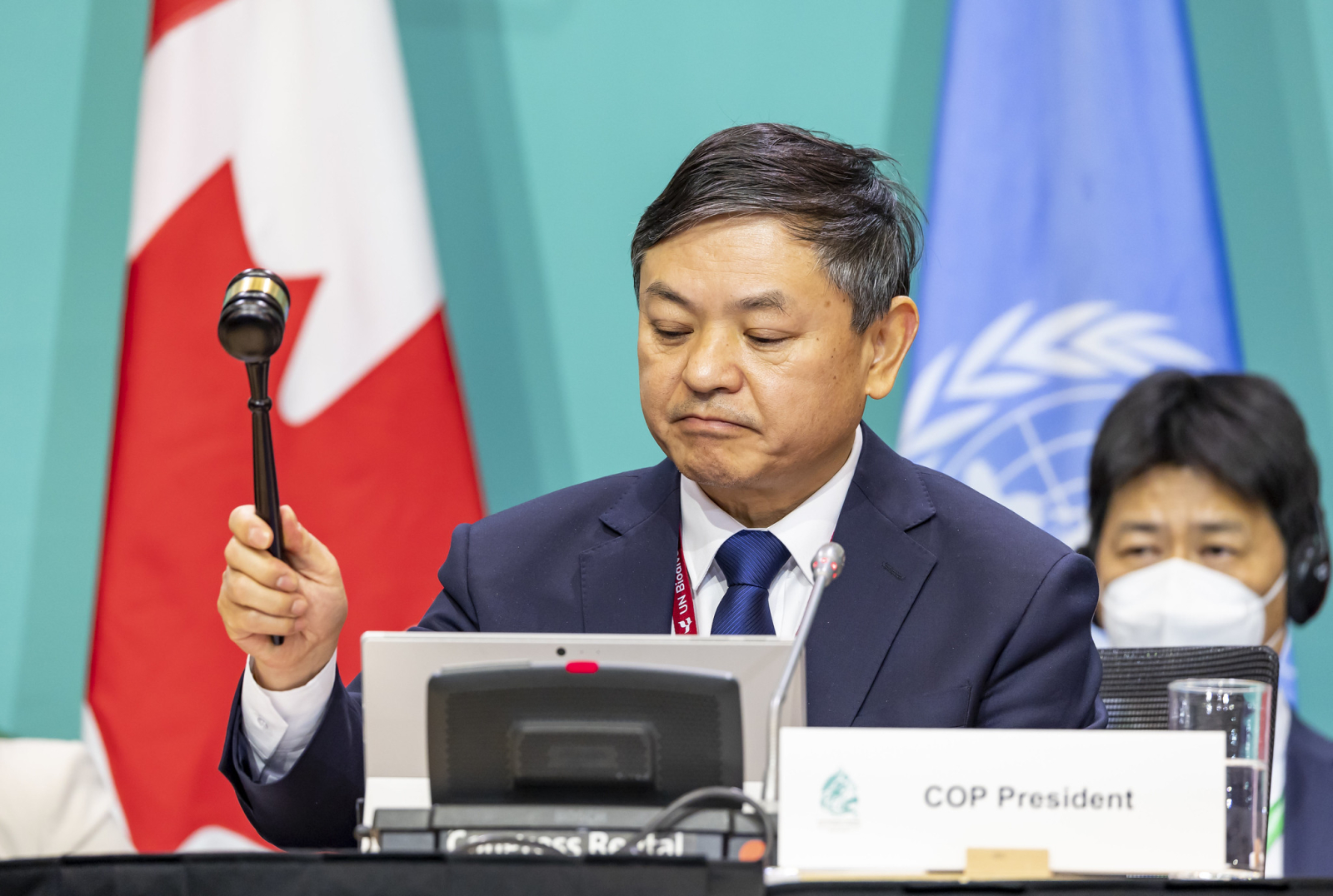Steven Guilbeault is on a mission to find common ground with an unlikely ally
Scroll down to continueApproaching his two-year anniversary on the job, Environment and Climate Change Minister Steven Guilbeault is hoping he’s found a new ally in the fight against climate change: China. An upcoming trip to Beijing will test that theory.
In an exclusive English media interview with Canada’s National Observer, Guilbeault described the trip to China he’ll be taking at the end of August to attend a meeting of the China Council for International Cooperation on Environment and Development — a high-level body that advises China on environmental and development issues. Guilbeault was invited by his Chinese counterpart and said he believes this is the first time a federal minister from Canada has travelled to China since 2018 — a sign his diplomatic approach is working.
“Maybe some [political opponents] will try and attack me” for travelling to China amid tensions between the two countries, Guilbeault said. “I am clearly a lightning rod for some of them, but I think Canadians in general will understand how important it is. We can't solve climate change, you can't solve the international biodiversity issue, without working with countries like China.
“The fact that the minister (Huang Runqiu) and I have been able to develop this good rapport is something both our countries feel is something we can build on,” he added.
“I certainly would like to see [if] there are things we can agree to work on together in the lead-up to COP28 and the lead-up to COP16.”
COPs, short for Conference of the Parties, are the United Nations’ regular climate change and nature protection meetings. The climate change summits happen annually, with this year's COP28 in Dubai, while the nature conferences occur every two years, with the last one (COP15) chaired by China and taking place in Montreal last December.
Guilbeault said his strategy is not to go and tell China what he thinks they should do, but rather he wants to look for common ground. For example, he said one of the sticking points in international climate diplomacy today is whether countries can agree to phasing out fossil fuels that don’t use some form of carbon capture technology by 2050. Given China is one of the world’s major consumers of fossil fuels and Canada is one of the world’s top producers, there’s room for conversation about “how we can work together on that in the lead-up to COP28,” he said.
Other potential space for collaboration includes ongoing negotiations around compensating poorer countries for climate impacts (called loss and damage financing) and how to breathe life into the global biodiversity framework inked last year in Montreal so that it doesn’t become yet another set of unmet targets.

The biodiversity COP in Montreal last year was widely seen as a success, with China presiding over the conference and Canada playing host to the world’s nations. Throughout COP15, Guilbeault told Canada’s National Observer he was trying to play the role of broker, and was proud to help land an agreement called the Kunming-Montreal Global Biodiversity Framework (GBF), which commits countries to protecting 30 per cent of land and oceans by 2030, and includes a call for rich countries to support poorer countries with US$200 billion to protect nature by the end of the decade.
Referring to himself and China’s Environment Minister Huang Runqiu, Guilbeault said: “We have a lot of skin in the game with the role we played in Montreal… Our collaboration was one of the keys to the success of COP15. Maybe our ongoing collaboration can be a key to the implementation of the GBF.”
Repairing relationships
Scroll down to continueExperts interviewed by Canada’s National Observer agree that building stronger diplomatic ties with countries like China will be crucial to combat rising greenhouse gas emissions and the extinction crisis at hand. As a close ally of global powers like the United States and European Union, Canada is seen as having an important role to play bridging the gap between western countries and emerging economies like China, India, Brazil and others.
Catherine Abreu, adviser to Canada’s Net-Zero Advisory Body and Destination Zero founder and executive director, said that in the past decade, the importance of climate and environmental issues has skyrocketed to become one of the top issues for international diplomacy. As a close watcher of climate negotiations, she said China hasn’t had as strong a stance on renewable energy recently as some expected given it’s the world’s top renewable energy exporter, and it may be for diplomatic reasons.
She suspects one of the reasons why is potentially because China is trying to leverage diplomatic talks with the United States, given the two countries have recently reopened negotiations with one another.
As a close ally of the United States, “there's perhaps a question of: ‘Can Canada cut into that conversation and get a little bit of movement out of China?’ Or at least understand where [does] China see itself in the energy transition,” she said. “We've certainly seen Canada play that sort of [bridge builder] role in the past.”

As evidence, Abreu pointed to Canada’s support for loss and damage financing and its role in launching an annual set of environmental diplomatic meetings called the “Ministerial on Climate Action” with China and the European Union in the wake of former U.S. president Donald Trump pulling the United States out of the Paris Agreement, which she said from Canada’s point of view could be read as an attempt to repair relationships in the diplomatic space.
Matthew Hoffmann, a University of Toronto professor and co-director of the Environmental Governance Lab at the Munk School of Global Affairs and Public Policy, said one of the factors that made the landmark Paris Agreement possible was the relationship between the United States and China improving.
“So engaging with China on this, I think, is important for a number of reasons … they're the elephant in the room for most emissions and for renewable energy,” he said. “And we hear in the Canadian discourse time and time again this ridiculous mantra of it doesn't matter what Canada does because it's just dwarfed by China's emissions — well, now we're directly engaging with China in a way that we haven't outside of the COPs.”
Tzeporah Berman, international program director at Stand.earth and chair of the Fossil Fuel Non-Proliferation Treaty Initiative, said whenever Canada steps into the world of climate diplomacy, it's both “encouraging and nerve-wracking” because Canada is still failing to bring its fossil fuel production in line with climate goals.
Fossil fuels are the reason United Nations Secretary-General António Guterres has said we’ve entered an era of “global boiling.” Meanwhile, Canada and the United States are the two countries planning the largest increase in fossil fuel production worldwide, she said.
Like Abreu, Berman described Canada having a successful track record in helping to broach important environmental agreements. At Canada’s best, the country “can punch way above its weight,” she said, pointing to major breakthroughs like the Montreal Protocol, which successfully saved the ozone layer. But Berman says Canada has to get its “own house in order” if it wants to be serious about climate leadership.

That’s because so much of climate diplomacy is built on trust and signalling to other countries genuine intention. Canada’s plan to increase fossil fuel production is simply at odds with climate leadership, she says, thereby eroding trust in the international system.
“If this government wants to be taken seriously on the international stage brokering these agreements, then we have to commit to no new expansion of oil and gas. That's the bottom line,” she said. “We have to be willing to work co-operatively with other countries to manage a wind-down in a way that's safe and fair and equitable and doesn't leave anyone behind.”
‘Very deliberate on our part’
Scroll down to continueChina isn’t the only major economy Canada is working with on climate and environmental grounds. Last year, Canada signed a memorandum of understanding with India to build stronger co-operation on environmental protection and curbing greenhouse gas emissions. Earlier this year, Global Affairs Minister Mélanie Joly also travelled to Brazil to strengthen relations with that country using forest protection and Indigenous rights as a basis to deepen their relationship.
Caroline Brouillette, executive director of Climate Action Network Canada, told Canada’s National Observer the G20, which includes major countries like the United States, China, Brazil, India, Indonesia, Canada, the U.K., and more, is an “essential space” for climate change negotiations because it's the bridge between large economies in the Global North and South. India is the current G20 president, and Brazil is taking the lead next year.
“It is strategic for Canada to be engaging bilaterally with other large economies and emitters that are within the Group of 20,” she said. “Canada is sometimes seen as less confrontational than some of our G7 counterparts, and so that bridge building is important.”

For Guilbeault, the decision to strengthen relationships with China, India and Brazil is no fluke.
“It’s very deliberate on our part,” he said. “We see the environment as being a tool of Canada's diplomacy, and I think that's something Minister Joly is very supportive of [and] the prime minister is very supportive of.
“You know, 10 to 15 years ago, the environment was this little thing here in the corner and a bunch of green ministers would talk to themselves and that was it. And I think now, these issues have a seat at the table of international issues on the same footing as the illegal invasion of Ukraine by Russia, as supply chain issues, as global economic issues.”
Hoffmann sees Canada’s deepening ties with Brazil, India and China as a sign that western countries are starting to understand that the battle against an overheating planet will “be won or lost” based on the relationships that can be built between powerful emerging economies and the rich countries that built their wealth and influence by powering their economies with fossil fuels for over a century.

He describes countries' relationships with one another as being on a path set by forces beyond an individual's control. Things like economic, political and historical forces. But there are moments –– “inflection points” –– where those forces create opportunity “for individuals to take action that can have significant impact,” Hoffmann said.
“The G20 is the arena, and so that diplomacy has to take place.”
